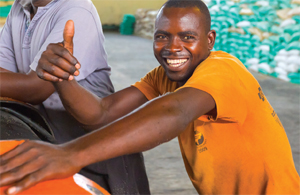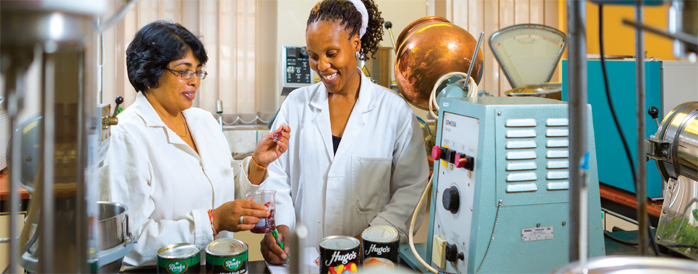HUMAN Resources
| Human capital | ||
| KEY ELEMENTS |
34 363 | PEOPLE EMPLOYED ACROSS SIX COUNTRIES | |||
| TONGAAT HULETT IS THE LARGEST PRIVATE SECTOR EMPLOYER IN ZIMBABWE AND MOZAMBIQUE | |||||
| 22 487 | PEOPLE ATTENDED TRAINING DURING THE YEAR | ||||
| KEY PRIORITIES GOING FORWARD |
RETENTION AND STRENGTHENING OF LEADERSHIP SKILLS | ||||
| DIVERSITY AND TRANSFORMATION | |||||
Tongaat Hulett’s approach to human capital is aligned with and supportive of the company’s strategic aspirations and operating business plans. This approach is informed by external dynamics, including socio-economic, regulatory and legislative factors, as well as internal operational priorities and resources requirements. Senior management is responsible for developing Tongaat Hulett’s human capital strategy and assessing its effectiveness on an on-going basis. Plans are implemented on a localised basis to ensure their relevance and impact within each specific operating context.
The business recognises the importance of providing a locally-relevant and competitive value proposition to attract, employ, retain and develop a diverse range of people who are able and motivated to contribute to the achievement of the business’s strategic goals.
EMPLOYEE BASE
The total workforce as at 31 March 2015 was 34 363, compared to a total of 35 065 the previous year. This includes full-time employees, fixed-term contractors and seasonal and casual workers. Attention is given to employee cost optimisation without negatively impacting the appropriate human resources required for the operations. The breakdown of Tongaat Hulett’s employee base per country as at 31 March 2015 is as follows:
| Operating country |
Full-time (Permanent) |
Fixed-term contractors |
Seasonal and casual workers (Nonpermanent) |
Total* |
| South Africa | 3 400 | 828 | 1 680 | 5 908 |
| Mozambique | 8 090 | 2 721 | 1 592 | 12 403 |
| Zimbabwe | 10 972 | 4 113 | 0 | 15 085 |
| Swaziland | 409 | 30 | 208 | 647 |
| Botswana | 111 | 0 | 0 | 111 |
| Namibia | 137 | 72 | 0 | 209 |
| Total | 23 119 | 7 764 | 3 480 | 34 363 |
SPECIALISED SKILLS
Tongaat Hulett’s operations require core and critical skills in the areas of agriculture, milling and refinery, marketing, sales, distribution and commercial skills, as well as engineering and technical skills. As many of these are specialised areas for sugar and starch agri-processing functions, key positions require the contribution of highly qualified, experienced and mobile people. Tongaat Hulett aims to maintain the required human capital capacity by improving the skills of current employees and attracting new resources from the external labour market, while building future capacity through graduate development programmes. The table below provides a breakdown of qualifications of these specialised skills across the company:
Number (as at |
Average age (as at |
Number (1 April 2014 - |
Number (1 April 2014 - |
|
| Degrees/ Diplomas | 1 248 | 42 | 46 | 107 |
| Artisans | 786 | 40 | 33 | 44 |
PERFORMANCE MANAGEMENT
A formalised performance management and succession process is in place for managing top talent in key roles at company level. Each operating entity has established performance management structures which attract and reward employees based on the specific operational and long-term skills requirements of each business.

With the identification of different talent segmentation of key skills and core capabilities, greater focus was directed towards ensuring retention and development of talent ‘bench-strength’ - in other words, the capacity of competent employees available for deployment in key roles and core functions. Tongaat Hulett has rolled out various individual and group talent management programmes to build and strengthen this capacity and enable employees to reach their potential.
DIVERSITY AND TRANSFORMATION
The company is focused on promoting diversity and transformation. Over time, Tongaat Hulett has achieved a steady improvement in this area as a result of a range of focused interventions and processes, including attracting, retaining and advancing the careers of women throughout the business, local nationals in Mozambique, and designated groups in South Africa.
TRAINING AND DEVELOPMENT
Employee training and development programmes at Tongaat Hulett are informed by business needs, operating challenges, existing skills supply and levels of competence, against the skills requirement for each of the operating companies. These can be categorised into four areas of skills improvement:
-
Safety, compliance training and certification

- Operations/core functional skills training
- Talent development and career advancement
- Long-term skills pipeline
Safety, compliance training and certification programmes include artisan training, and Safety, Health and Environment (SHE) training, as well as motorised equipment (such as fork-lifts) training. These programmes are considered high priority, and are conducted in line with operational goals and a continued focus on employee safety and welfare.
Operations/core functional skills training programmes are driven by requirements at operational level to achieve the company’s overarching performance objectives. Core competencies include agricultural skills, farm management, supervisory management skills, technical skills, and production and manufacturing skills. Training is extended to employees not directly employed by Tongaat Hulett but that are part of the company’s agriculture supply chain; for example, private and small-scale farmers.
Talent development and career advancement programmes provide employees with opportunities to study further through the employee study support scheme, thereby improving their skills for immediate and future utilisation as well as for career advancement.
Long-term skills needs were identified by assessing the succession requirements of senior positions, along with internal and external available resources, to cater for the future demands of the business. To address this, various development programmes are in place as part of the Graduate Development Programme, mainly in production, manufacturing, agriculture and commercial operations, such as strategic sourcing. The Graduate Development Programme is a response to the challenge of youth unemployment and access to education and is structured to align with the skills needs of the company. Whenever possible, entry-level opportunities are allocated to graduate and school-leaver candidates.
Tongaat Hulett’s total training and development spend for the 2014/15 financial year exceeded R37,5 million (2013/14: R50 million).
The various categories of training and development programmes are provided in the table below:
| Programme categories | Number of employees who attended training from 1 April 2014 to 31 March 2015 | Percentage |
| Safety, compliance training and certification | ||
| SHE | 10 922 | 48,6 |
| Driver - forklift/crane/tractor | 2 437 | 10,8 |
| First aid | 521 | 2,3 |
| Advanced accident and emergency care | 103 | 0,5 |
| Food safety | 919 | 4,1 |
| Defensive driving | 579 | 2,6 |
| Occupational Health and Safety legislation | 256 | 1,1 |
| Alco meter use (Alcohol detecting machine) | 100 | 0,4 |
| Fire fighting | 33 | 0,1 |
| Operations/core functional skills training | ||
| Agricultural skills | 4 817 | 21,4 |
| Engineering and technology | 146 | 0,6 |
| Information technology | 20 | 0,1 |
| Management and supervisory skills | 242 | 1,1 |
| Admin/business skills/finance | 163 | 0,7 |
| Human resources | 108 | 0,5 |
| Small growers programme | 90 | 0,4 |
| Process training/Boiler attendant programme | 40 | 0,2 |
| Commercial and marketing | 50 | 0,2 |
| Manufacturing and production | 353 | 1,6 |
| Medical | 95 | 0,4 |
| Talent development and career advancement | ||
| Life skills | 111 | 0,5 |
| Other interventions, specific to groups/individuals | 382 | 1,7 |
| Total | 22 487 | |
The long-term skills development and graduate programmes comprise a range of support mechanisms from school level to tertiary and workforce entry level. These include education bursaries, engineers-in-training (EIT), in-service training and learnerships and are structured to be accessible to individuals from diverse socio-economic backgrounds with varying levels of competency and work readiness. Tongaat Hulett had 452 school-leavers and graduates in training at various levels of exposure and development during the 2014/15 financial year (2013/14: 472).
Skills and graduate development programmes vary in focus and roll-out in the different geographies.
The table below provides a summary of the various programmes across all operations:
| Graduate development programmes, entry-level skills training (All operations) | |
| Programme | Number of participants |
| Engineers-in-training (EIT) | 19 |
| Agronomist trainees | 1 |
| Agriculture farm manager training | 8 |
| Agriculturist-in-training | 20 |
| Strategic sourcing trainees | 2 |
| Production | 23 |
| In-service trainees | 60 |
| SHE trainees | 3 |
| Apprenticeships (various trades) | 130 |
| Learnerships | 22 |
| Graduate trainees | 32 |
| Communications and marketing | 1 |
| Student development programme | 5 |
| General learners/trainees | 68 |
| Workplace experience | 17 |
| Bursaries | 41 |
| Total | 452 |
There is also specific focus on artisan training, which is generally longer in duration than the graduate development programme.
| Artisan training (All operations) | Number of participants |
| Artisans-in-training | 449 |
| Artisan development | 20 |
| Artisan aid development programme | 12 |
| Total | 481 |
COMPLIANCE WITH LEGISLATION AND REGULATIONS IN EMPLOYEE MANAGEMENT IN SOUTH AFRICA
Tongaat Hulett complies with the various legislative and regulatory frameworks with regards to employee management and skills development reporting in all countries of operation. The operating companies in South Africa, which incorporate Sugar, Starch and Developments, comply with the various employment legislation relating to affirmative action, employment equity, labour relations, skills development and other relevant laws. In line with South African regulation, this information for the period 1 April 2014 to 31 March 2015 is provided in the following pages. It is only applicable to the South African operations and does not include other operating geographies. Of the overall training costs of R37,6 million, a total of R28,0 million was spent on the South African operations, with the different categories of spend outlined in the table below:
| 1 percent skills levy | R13,9 million |
| Training spend as a percentage of leviable amount | 2,0% |
| Number of person days trained | 5 943 |
| Number of person days available | 1 345 347 |
| Percentage trained person days | 0,44 |
| Number of persons trained | 1 731 |
| Expenditure on African, Coloured and Indian employees | R24,3 million |
| Expenditure on African, Coloured and Indian women | R11,0 million |
| Expenditure on employees with disabilities | R220 597 |
PERSONS WITH DISABILITIES
Tongaat Hulett is committed to providing a work environment that empowers people with disabilities to reach their potential and contribute productively in their work environment. There were 63 employees with disabilities as at 31 March 2015 (2013/14: 68) in South Africa (aligned with legislated reporting requirements), which constituted 1,1 percent of the total employee complement (2013/14: 1,4 percent).
EMPLOYMENT EQUITY AND AFFIRMATIVE ACTION
In the South African operations, a strong employment equity culture has been fostered over many years and significant improvement have been achieved. In terms of the representation of designated groups, particular emphasis is placed on Africans, black women and persons with disabilities. As at 31 March 2015, 63,3 percent of management (2013/14: 62,3 percent) and 85,4 percent of skilled and supervisory positions are filled by black employees (2013/14: 84,6 percent). Women constitute 32,8 percent of the workforce across South African operations (2014: 29,9 percent). In terms of the professional skills profile, 76,1 percent of the graduate and diplomate employees are black (2013/14: 76,1 percent), with women constituting 46,3 percent (2013/14: 46,8 percent).
Employee transformation programmes are also a focus in Mozambique and Zimbabwe.
The overall proportion of black representation at management level at 31 March 2015 was 63,3 percent of permanent staff, compared to 62,3 percent at 31 March 2014. Women at senior management level increased from 16,2 percent to 18,6 percent at 31 March 2015, the proportion of black females in top management remained constant at 28 percent at 31 March 2015 and black females in management increased slightly from 22,2 percent to 22,3 percent in March 2015.
INDUSTRIAL RELATIONS
Human rights
Within its sphere of influence, Tongaat Hulett implements protection for basic human rights. The company is a signatory to the Universal Declaration of Human Rights, in which it commits, among others, to supporting freedom of association and collective bargaining at its locations, as well as preventing child and/or forced labour. Tongaat Hulett has incorporated human rights principles in its practices, and operates within a Code of Business Conduct and Ethics, which supports its commitment to a policy of fair dealing, honesty and integrity in the conduct of its business.
Child labour, forced and compulsory labour
Tongaat Hulett does not make use of child labour and does not tolerate the inhumane treatment of employees, including any form of illegal forced labour, physical punishment or other abuse.
Freedom of association and collective bargaining
Tongaat Hulett employees have the right to freedom of association. The company has always strived to maintain a constructive relationship with unions and a climate of industrial accord has generally prevailed. There are recognition agreements with 12 different unions as at 31 March 2015 and approximately 38 percent of permanent employees are members of unions. In South Africa, the SAEWA union became active in the year and at this stage only represents employees from the Refinery. During the year the SAAPAWU union had a number of its members leave and join FAWU.

In Zimbabwe, union membership is determined through deduction of union dues. Since January 2015, the biggest union registered for the industry, Zimbabwe Sugar Milling Industry Workers Union (ZISMIWU), had membership dues stopped by government owing to a need to investigate alleged financial impropriety by the union executives and as at 31 March 2015, there were no membership dues being deducted. The Sugar Production and Milling Workers Union is a recognised union which was registered in December 2014.
The formally recognised trade unions are provided in the table below:
| Country | Recognised union |
| South Africa | Food and Allied Workers Union (FAWU) |
| National Sugar and Refining and Allied Industries Employees Union (NASARAIEU) | |
| Southern African Equity Workers Union (SAEWA) | |
| United Association of South Africa (UASA) | |
| National Union of Public Service and Allied Workers (NUPSAW) | |
| Zimbabwe | Sugar Production and Milling Worker Union of Zimbabwe (SPMWUZ) |
| Zimbabwe Sugar Milling Industry Workers Union (ZISMIWU) | |
| Zimbabwe Hotel and Catering Workers Union (ZHCWU) | |
| Mozambique | Sindicato Nacional dos Trabalhadores da Industria Do Açucar e Afins (SINTIA) |
| Swaziland | Swaziland Agriculture and Plant Workers Union (SAPWU) |
| Botswana | Botswana Beverages and Allied Workers Union (BBAWU) |
| Namibia | Namibian Food and Allied Workers Union (NAFAU) |
During the 2014/15 financial year, there were five strike days at Mafambisse which involved 600 employees with a cost implication of R200 000. There were 34 strike days at the South African sugar refinery which involved 420 employees and 12 strike days at Voermol which involved 1 064 employees. The collective cost of the strike action at the refinery and Voermol amounted to R9,7 million.
CASE STUDY
GIDION MUNYARADZI Gidion completed his apprenticeship training in 1996 and worked as an electrician for six years at Zimbabwe Alloys, never imagining that one day he would head up Safety, Health and Environment (SHE) activities for Tongaat Hulett. To read more about Gidion, go to www.tongaat.com/2015/gidion_munyaradzi.pdf |
Disciplinary procedures
The disciplinary codes and procedures make provision for corrective behavior in a just, equitable, non-discriminatory and consistent manner, in line with the relevant labour legislation. If any employee feels unjustly treated, they are entitled to exercise their rights in terms of the particular operation’s internal appeal procedure and the relevant legislation. Disciplinary codes and procedures have been implemented at local operations, after negotiations with the relevant trade unions.
Grievance procedures
The company’s grievance procedures are intended to create an environment that is conducive to good employee relations, by facilitating prompt and fair action by the company when employees raise legitimate complaints. The procedures are structured such that ensure that grievances can be resolved as near to their point of origin as possible, and within a reasonable timeframe.
Anti-bribery and corruption
Tongaat Hulett endeavors to uphold core business values and actively works to prevent corruption and bribery. The company has procedures in place that provide guidance on areas such as dealing with gifts and donations. Employees of Tongaat Hulett who do not comply with the company’s Code of Business Conduct and Ethics face disciplinary action, including dismissal.



